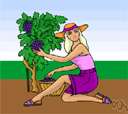vit·i·cul·ture
(vĭt′ĭ-kŭl′chər, vī′tĭ-)n.
The cultivation of grapes, especially for use in making wine.
vit′i·cul′tur·al adj.
vit′i·cul′tur·ist n.
American Heritage® Dictionary of the English Language, Fifth Edition. Copyright © 2016 by Houghton Mifflin Harcourt Publishing Company. Published by Houghton Mifflin Harcourt Publishing Company. All rights reserved.
viticulture
(ˈvɪtɪˌkʌltʃə)n
1. (Agriculture) the science, art, or process of cultivating grapevines
2. (Agriculture) the study of grapes and the growing of grapes
[C19: viti-, from Latin vītis vine]
ˌvitiˈcultural adj
ˌvitiˈculturally adv
ˌvitiˈculturer, ˌvitiˈculturist n
Collins English Dictionary – Complete and Unabridged, 12th Edition 2014 © HarperCollins Publishers 1991, 1994, 1998, 2000, 2003, 2006, 2007, 2009, 2011, 2014
vit•i•cul•ture
(ˈvɪt ɪˌkʌl tʃər, ˈvaɪ tɪ-)n.
the culture or cultivation of grapes and grapevines.
[1870–75; < Latin vīti(s) vine + culture]
vit`i•cul′tur•al, adj.
vit`i•cul′tur•ist, n.
Random House Kernerman Webster's College Dictionary, © 2010 K Dictionaries Ltd. Copyright 2005, 1997, 1991 by Random House, Inc. All rights reserved.
viticulture
1. the science that studies grapes and their culture.
2. the cultivation of grapes and grapevines. Also called viniculture. — viticulturist, n. — viticultural, viticulturist, adj.
See also: Wine2. the cultivation of grapes and grapevines. Also called viniculture. — viticulturist, n. — viticultural, viticulturist, adj.
-Ologies & -Isms. Copyright 2008 The Gale Group, Inc. All rights reserved.
ThesaurusAntonymsRelated WordsSynonymsLegend:
| Noun | 1. |  viticulture - the cultivation of grapes and grape vines; grape growing viticulture - the cultivation of grapes and grape vines; grape growingculture - the raising of plants or animals; "the culture of oysters" resinate - impregnate with resin to give a special flavor to; "Greek wines are often resinated" |
Based on WordNet 3.0, Farlex clipart collection. © 2003-2012 Princeton University, Farlex Inc.
Translations
Collins Spanish Dictionary - Complete and Unabridged 8th Edition 2005 © William Collins Sons & Co. Ltd. 1971, 1988 © HarperCollins Publishers 1992, 1993, 1996, 1997, 2000, 2003, 2005
viticulture
n → Weinbau m
Collins German Dictionary – Complete and Unabridged 7th Edition 2005. © William Collins Sons & Co. Ltd. 1980 © HarperCollins Publishers 1991, 1997, 1999, 2004, 2005, 2007